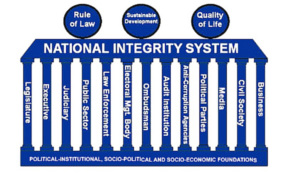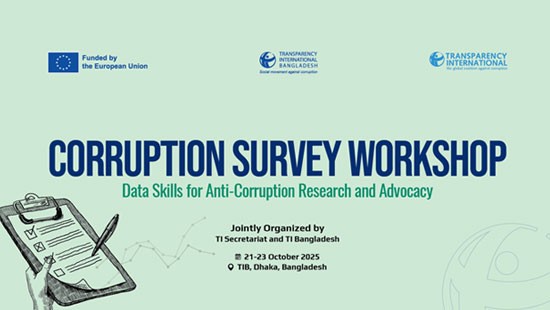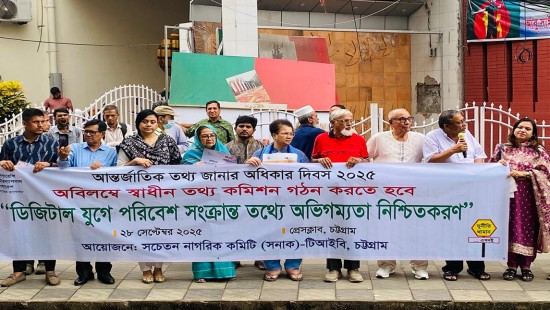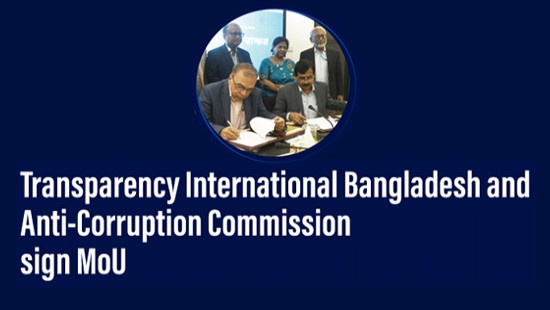Published: 14 May 2014
A weak National Integrity System (NIS) bedeviled by wide gap of practice and implementation compared to legal provisions and institutional capacity is undermining the prospect of governance and nourishing corruption, reveals a study of Transparency International Bangladesh (TIB) released today. The study conducted on 15 NIS institutions between August 2012 – September 2013, shows that despite having relatively strong legal framework, resources and institutional framework their implementation and practice are largely inadequate and a culture of non-compliance generally prevails resulting in a lower than possible level of transparent and accountable governance in the country.The report titled ‘National Integrity System Assessment: Bangladesh’ was released today at the BRAC Center in Dhaka. Similar studies were also done on Maldives, Nepal, Pakistan and Sri Lanka by respective chapters of Transparency International. Co-aouthors of the report Professor Salahuddin M. Aminuzzaman of University of Dhaka and Professor Sumaiya Khair, Deputy Executive Director of TIB presented the findings. The organization’s Chairperson of the Board of Trustees Advocate Sultana Kamal and Executive Director Dr. Iftekharuzzaman were also present. The 15 pillars of NIS covered by the study are: Parliament, Executive, Judiciary, Public Administration, Local Government, Police, Comptroller and Auditor General, Election Commission, Anti-Corruption Commission, National Human Rights Commission, Information Commission, Political Parties, Civil Society, Media, and Business sector. Each institution has been assessed in terms of legal provision, capacity, governance and role. The study focuses particularly on the legal framework and the actual institutional practice. It is a qualitative study and has relied on a combination of primary and secondary data, including relevant national laws, research, reports (media and otherwise), and key informant interviews. The research output has undergone a peer review and libel check and has been validated by a strong 8-member Advisory Group. The National Integrity System (NIS) assessment provides a benchmark for analysing the robustness and effectiveness of a country’s institutions of accountability in addressing corruption, the press conference was told. According to the study a dysfunctional parliament bedeviled by the culture of boycott, a dominant power exercising executive, and increasing politicization of the bureaucracy, police and judiciary has resulted in lack of oversight, transparency and accountability required for establishing good governance. |
On the other side, people’s confidence in various Commissions, e.g., Election Commission, Anti-Corruption Commission, National Human Rights Commission and Information Commission of the Government have gone down following doubts raised about their independence and effectiveness. The study also found crisis of internal governance in political parties, civil society and the media.
As the study has been undertaken against the backdrop of the adoption of the National Integrity Strategy 2012 (Jatiyo Shudhachar Koushol), by the Government of Bangladesh, we hope that its findings and recommendations will provide extremely valuable support to the implementation process of the strategy
While talking to the media during the press conference the Executive Director of TIB Dr. Iftekharuzzaman said, “While the lack of political will has been a continuing stumbling block in the process of democratic and accountable governance in Bangladesh, there are other cross cutting issues that have a direct bearing on the current NIS which include ominous level of partisan political influence on the institutions, weak oversight, insufficient resources, lack of incentives, dearth of technical and professional competence, nepotism, and corruption and an absence of exemplary punishment for corruption leading to a culture of impunity.”He further said, “As the study has been undertaken against the backdrop of the adoption of the National Integrity Strategy 2012 (Jatiyo Shudhachar Koushol), by the Government of Bangladesh, we hope that its findings and recommendations will provide extremely valuable support to the implementation process of the strategy”. |
|
|
Weak national integrity system undermines governance, nourishes corruption -TIB (Bangla)
Weak national integrity system undermines governance, nourishes corruption -TIB (English)
Full Report on NICSA Study (English)
Executive Summary on NICSA Study (English)
Executive Summary on NICSA Study (Bangla)








